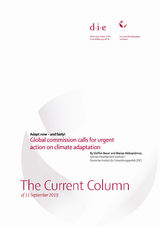Adapt now – and fairly!
Global commission calls for urgent action on climate adaptation
Bauer, Steffen / Mariya AleksandrovaThe Current Column (2019)
Bonn: German Development Institute / Deutsches Institut für Entwicklungspolitik (DIE), (The Current Column of 11 September 2019)
Bonn, 11 September 2019. The house is on fire! Even if the international community was to succeed in halting average global temperature increase at 1.5°C, the world is already facing increasingly dire consequences resulting from climate change. Extreme weather events, like hurricane Dorian, will become more frequent. Equally daunting, if less noticed, slow onset events like sea-level rise, prolonged droughts, coral bleaching or salinisation of farmland will affect millions of livelihoods, indeed, lives around the globe. Recent special reports by the Intergovernmental Panel on Climate Change (IPCC) on Global Warming of 1.5°C and on Land have made this abundantly clear. The mounting pressure on governments and businesses from scientists, nongovernmental organisations and, crucially, effective opposition from young generations and even electorates to act on climate change, warrants some renewed optimism. Yet, countries remain off-track in terms of adequately ambitious mitigation and adaptation action. While the imperative to drastically reduce carbon emissions is now widely understood, governments and business leaders still need to get their heads around the adaptation challenge, and quickly. A report launched this week by the Global Commission on Adaptation makes this point with striking straightforwardness. The commission, established in 2018 and co-chaired by former UN Secretary-General Ban Ki-Moon, Bill Gates and Worldbank CEO Kristalina Georgieva, is advancing a powerful narrative to accelerate adaptation action. It draws on the authority of 34 high-level members, including Germany’s Federal Minister for Economic Cooperation and Development, Gerd Müller. Specifically, the commission’s timely call to “Adapt now” is underpinned by a threefold urge to respond to climate change. There is a pressing need to address climate-induced inequalities (human imperative) and a strong rationale to protect and to draw on nature to build resilience (environmental imperative); not least, this requires fostering investments in adaptation, both from public and private sources (economic imperative). Responding to these imperatives is assumed to generate a “triple dividend” in which avoided losses, economic benefits as well as social and environmental benefits combine. Accordingly, investing $1.8 trillion globally in early warning systems, climate-resilient infrastructure, enhanced dryland agriculture, mangrove protection, and improved water resource management by 2030 could generate total net benefits of $7.1 trillion. The commission boldly calls for “revolutions” in understanding climate risks, in planning and implementing adaptation solutions, and in public and private financing mechanisms to build resilience. To these ends, it sets specific targets in high-impact areas – “action tracks” – including food security and smallholder livelihoods, natural environment, water, cities and urban areas, infrastructure, and disaster risk management. Crucially, it singles out locally-led action, nature-based solutions and finance and investment as starting points for effective adaptation. The report also argues strongly that investments into adaptation and resilience need to be fair. While fairness seems a lofty concept, adaptation action should indeed reflect the fact that those who have contributed least to anthropogenic warming are typically the ones most exposed to its impacts. Bluntly speaking, adaptation measures in rich countries must not be at the expense of poor countries. This all points in the right direction. At the same time, the report raises questions about its position in the overall climate governance landscape. While mitigation efforts have traditionally preoccupied much of multilateral climate negotiations, adaptation needs have long become an integral component of global climate policy, too. Indeed, adaptation as well as the issue of loss and damage associated with climate change have been squarely anchored as key issues of international climate governance in distinct articles of the Paris Agreement. Surely, the Global Commission on Adaptation neither implies to reinvent the wheel nor to proliferate institutional redundancies and turf battles. Yet, the report does not clarify the envisioned relationship between the work of the commission and its proposed action tracks on the one hand and the institutional architecture of the UN Framework Convention on Climate Change (UNFCCC) and its Paris Agreement on the other hand. Likewise, it remains rather silent on the limits to adaptation and the risks of maladaptation, the acknowledgement of which would also help to further a comprehensive debate on the dos and don’ts of adaptation policy and to set priorities for action in a fair and transparent manner. This will also help to confront the reality that, while it is indeed imperative to mobilise far more resources to invest into adaptation, more money in and of itself will not solve the challenges associated with climate risks. We can’t simply buy out, we need to adapt – now!



